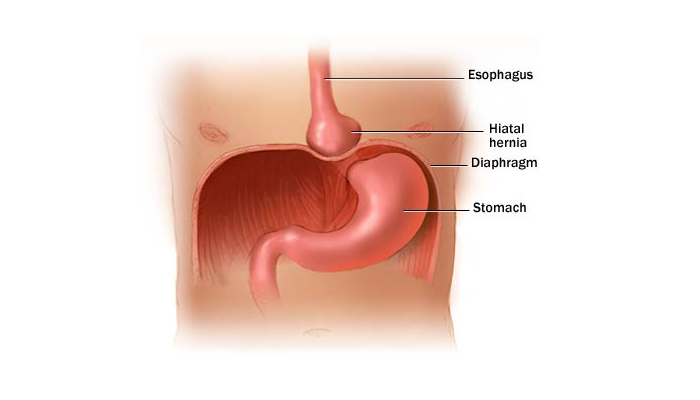What is a Hiatal Hernia?
A hiatal hernia occurs when the upper part of the stomach pushes through the diaphragm into the chest cavity through an opening called the hiatus. The diaphragm is a thin muscle that separates the chest cavity from the abdomen and plays a key role in breathing.
While hiatal hernias can affect people of any age or gender, many cases are asymptomatic. However, when symptoms occur, they often resemble GERD (gastroesophageal reflux disease), including:
✔ Heartburn & acid reflux
✔ Chest pain or discomfort
✔ Difficulty swallowing (dysphagia)
✔ Regurgitation of food or stomach acid
Mild cases can be managed with dietary changes and medications, but severe cases may require surgical intervention. For expert diagnosis and treatment, consult Dr. Ujwal Zambare, leading GI Surgeon & Gastroenterologist in Wakad, PCMC, Pune.

Who is at Risk for Developing a Hiatal Hernia?
The main cause of stomach cancer is a genetic mutation (change) in the cells of the stomach, which causes the cells to grow rapidly and eventually form a tumor. Risk factors that can increase a person’s chance of getting stomach cancer include
What Causes a Hiatal Hernia?
The most common cause of a hiatal hernia is an increase in pressure in the abdominal cavity. Your abdominal cavity is the space in the middle of your body that holds several organs, including the:
- Lower part of the esophagus and stomach.
- Small intestine, colon and rectum.
- Liver.
- Gallbladder, pancreas and spleen.
- Kidneys.
- Bladder.
What are the Symptoms of a Hiatal Hernia?
Many people with a hiatal hernia never have symptoms. Some people with hiatal hernia have some of the same symptoms as gastroesophageal reflex disease (GERD). GERD occurs when digestive juices move from the stomach back into the esophagus. Symptoms of GERD include:
- Heartburn.
- Bitter or sour taste in the back of the throat.
- Bloating and belching.
- Discomfort or pain in the stomach or esophagus.
How is a Hiatal Hernia Treated?
Most hiatal hernias do not cause problems and rarely need treatment. However, since some patients with a hiatal hernia have symptoms of GERD, treatment starts with methods used to manage GERD. These include making such lifestyle changes as:
- Losing weight if you’re overweight.
- Decreasing the portion sizes of meals.
- Avoiding certain acidic foods—such as tomato sauce and citrus fruits or juices—that can irritate the esophageal lining.
- Limiting fried and fatty foods, foods or drinks containing caffeine (including chocolate), peppermint, carbonated beverages, alcoholic beverages, ketchup and mustard, and vinegar.
- Eating meals at least three to four hours before lying down, and avoiding bedtime snacks.
A hiatal hernia can often be managed with lifestyle changes and medications, but severe cases may require surgical intervention. If you’re experiencing persistent symptoms, early diagnosis and treatment are key to preventing complications. For expert consultation, contact Dr. Ujwal Zambare, renowned GI Surgeon & Gastroenterologist in Wakad, Pune. Call 098159 94279 to schedule your appointment today!
